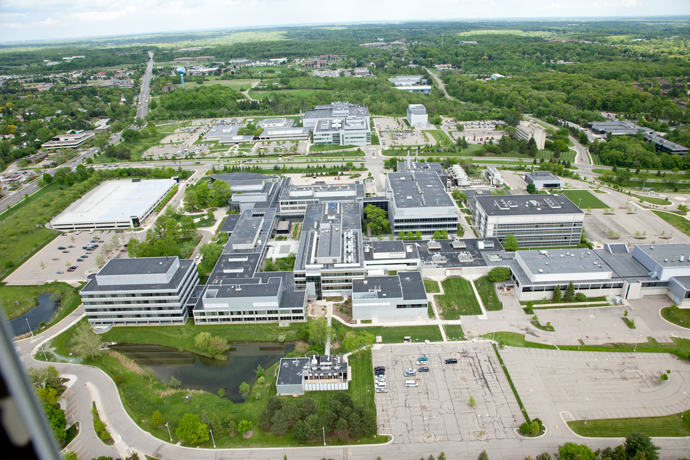Alittle more than three years ago, the University of Michigan completed its US$108-million acquisition of the former Pfizer campus in Ann Arbor and re-named the site the University of Michigan North Campus Research Complex (NCRC). University officials estimated then that at least 2,000 jobs would be created over the next decade at the 174-acre (70-hectare) site that encompasses nearly 2 million sq. ft. (185,800 sq. m.) of lab and office space in 28 buildings.
The NCRC is well on its way to exceeding that employment goal with more than 1,400 now employed.The university projects that figure will reach 1,700 by year’s end.
The Institute for Healthcare Policy and Innovation (IHPI) is the latest agency to locate at the campus. IHPI’s members study topics in healthcare delivery, coverage and policy related to a range of topics including cancer, heart disease, diabetes, children’s health, surgery and mental health, according to the University of Michigan Health System. More than 80 researchers and staff have moved in to the NCRC and that number is expected to exceed 400 in the coming months.
The University of Michigan describes IHPI’s mission as being to enhance the health and well-being of local, national and global populations through innovative, interdisciplinary health services research that informs public and private efforts to optimize the quality, safety, equity and affordability of healthcare services. The university expects IHPI to become the largest academic-based collection of health services and healthcare policy researchers in the country.
“Moving to NCRC has the potential to be transformative. Our patient safety program will now be surrounded by high-caliber and multidisciplinary health services researchers who are committed to turning ideas into action,” said Dr. Sanjay Saint, professor of internal medicine, U-M Medical School, and associate chief of medicine, VA Ann Arbor Healthcare System.
A little more than half of the members of IHPI are faculty in the U-M Medical School, where IHPI is based, and nearly a quarter are from the U-M School of Public Health. The rest come from the university’s colleges of Engineering, Pharmacy, and Literature, Science & the Arts, its schools of Business, Dentistry, Law, Nursing, Public Policy and Social Work, and its Institute for Social Research.
The University of Michigan says nearly 300,000 sq. ft. (27,870 sq. m.) of lab and office space is now in use. Here is how some of that space is being used:
- Twenty private companies lease space at NCRC, including BoroPharm, Lycera, and 18 U-M spinoff companies in the Venture Accelerator.
- Seventy-three percent of dedicated space is occupied by Medical School, 3 percent by Hospitals and Health Centers, 17 percent by other U-M units, 7 percent by non-U-M entities including the VA.
- BoroPharm, a spinoff from Michigan State University was the NCRC’s first tenant. It specializes in producing boranic acid in an efficient, environmentally friendly way. It supplies chemicals to drug and agricultural companies.
- Lycera, which is also a University of Michigan spinoff, is a biopharmaceutical company developing approaches to the discovery and development of novel oral medicines for treating autoimmune diseases. It moved into 14,000 sq. ft. (1,386 sq. m.) of space at the NCRC last fall.
- Seven scientific research initiatives bring together hundreds of researchers from many disciplines and schools for work in Cardiovascular Research, Translational Oncology, the Institute for Healthcare Policy and Innovation, Emergency Medicine, Computational Medicine and Bioinformatics, Distributed Health Technologies and Biointerfaces.
Pfizer and the companies it acquired—Parke-Davis and Warner Lambert—had a presence in Ann Arbor dating back to 1959. At one time Pfizer employed 3,600 at the site. That number was about 2,100 when the site closed in 2007. Ironically, the University of Michigan was the owner of the site when it sold the land to Parke-Davis in 1957.
